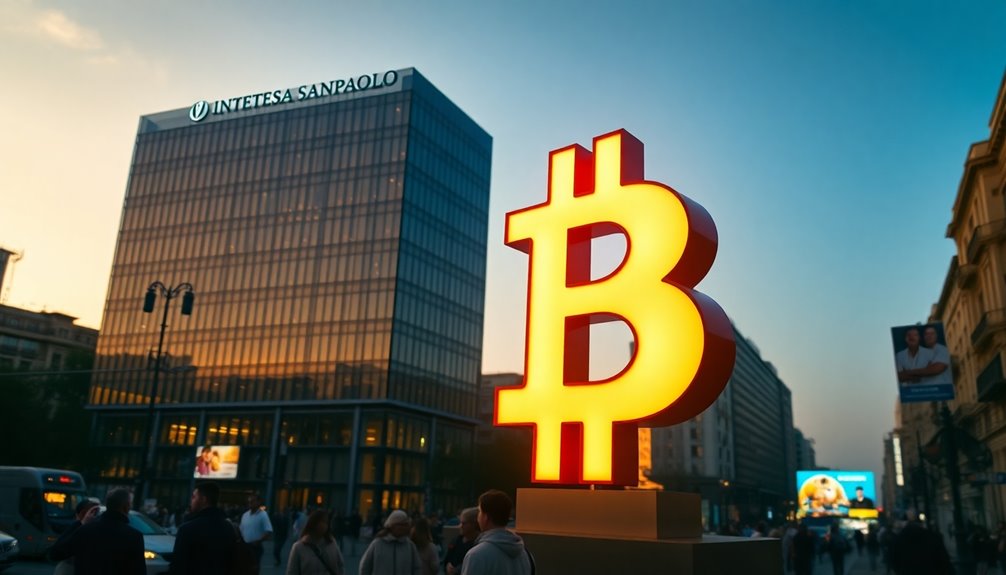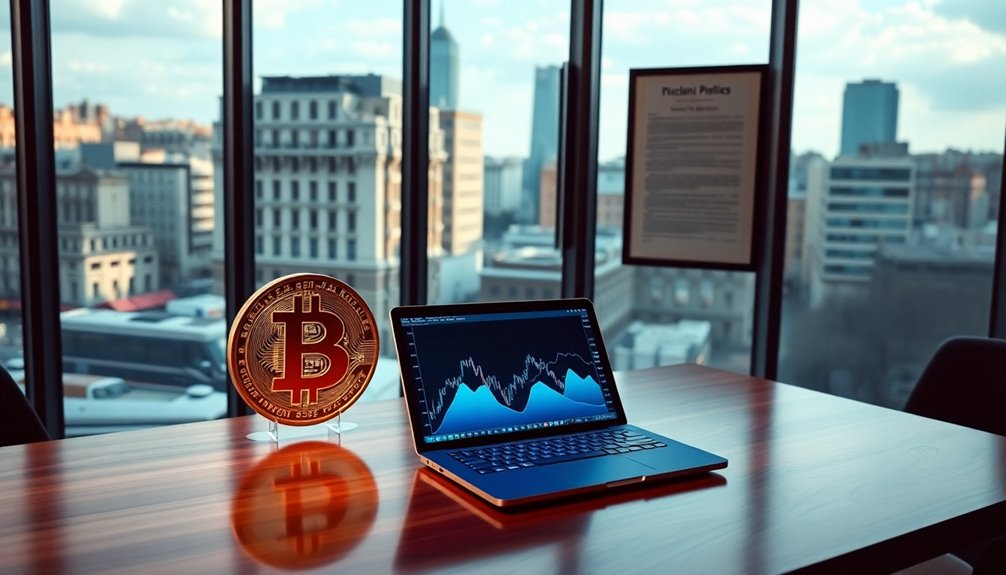Italy's largest banking group, Intesa Sanpaolo, recently bought $1 million in Bitcoin, showcasing a bold move into the crypto space. This purchase highlights their expanding strategy within digital assets, as they've already launched trading options and futures in 2023. However, this decision hasn't gone unnoticed, attracting scrutiny from regulatory bodies that emphasize risk management in cryptocurrency activities. As the market remains volatile, Intesa's integration of Bitcoin may enhance customer experience and reduce fees. If you're curious about the implications and future of this investment, there's more to uncover about their plans and the broader crypto landscape.
Key Takeaways
- Intesa Sanpaolo's recent $1 million Bitcoin purchase has drawn regulatory scrutiny from financial oversight bodies regarding its cryptocurrency activities.
- The bank's investment aligns with its strategy to expand its proprietary crypto trading desk within corporate and investment banking.
- Intesa Sanpaolo's commitment to blockchain technology since 2014 supports its cryptocurrency initiatives and enhances operational efficiency.
- Regulatory agencies like the OCC and FDIC emphasize prudent risk management for banks engaging in cryptocurrency transactions.
- The purchase aims to attract tech-savvy customers and reduce transaction fees, enhancing the bank's market presence.
Italy's Banking Giant Invests

As Intesa Sanpaolo expands its digital assets desk, it's positioning itself as a leader in the cryptocurrency space.
You'll notice that the bank has set up a proprietary crypto trading desk within its corporate and investment banking division, trading options, futures, and ETFs since 2023. By collaborating with companies like Itez.com, it enhances its crypto trading experience.
Plus, Intesa Sanpaolo supports transactions through major payment systems like Visa and Mastercard, making crypto more accessible in Italy.
Since exploring blockchain technology since 2014, the bank's focus on both public and private blockchains demonstrates its commitment to understanding the technology's applications. This expansion reflects the increasing adoption of cryptocurrencies by financial institutions.
All these efforts signal Intesa Sanpaolo's intention to lead in the evolving digital asset landscape.
Bitcoin Purchase Sparks Regulatory Interest

Intesa Sanpaolo's recent Bitcoin purchase has ignited significant regulatory interest, prompting scrutiny from various financial oversight bodies. The Office of the Comptroller of the Currency (OCC) emphasizes prudent risk management in cryptocurrency activities, while the Federal Deposit Insurance Corporation (FDIC) has shifted to a bottom-up approach for specific feedback. The Federal Reserve Board (FRB) requires banks to notify supervisors about cryptocurrency engagements, ensuring compliance with laws. Additionally, the FDIC's supervisory approach emphasizes case-specific feedback on crypto activities, indicating increased scrutiny on banks' risk management systems. Concerns about security and volatility have led to new restrictions from the FRB, which may prohibit most cryptocurrency banking activities unless banks demonstrate secure practices. Internationally, the Financial Stability Board (FSB) is working on a global regulatory baseline to promote safe innovation in the crypto-asset market.
Cryptocurrency Price Volatility

While the allure of cryptocurrencies draws many investors, the inherent price volatility can be daunting. Market sentiment plays a significant role, with prices often swaying based on positive or negative news.
You might notice that emotional trading, fueled by fear or greed, can amplify these fluctuations. This herd mentality can lead to rapid price swings, driven by collective actions of investors. Additionally, supply and demand dynamics are crucial; limited supply can cause prices to surge when demand rises, while oversupply can lead to declines. To mitigate these risks, investors should consider implementing risk management strategies to protect their investments.
Moreover, institutional investments can introduce significant capital inflows, amplifying market reactions further. Regulatory changes and security breaches further complicate the landscape, often resulting in swift market reactions.
Understanding these factors can help you navigate the unpredictable world of cryptocurrency investments.
Corporate Bitcoin Integration

Integrating Bitcoin into corporate strategies can significantly enhance a company's market presence and operational efficiency. By embracing cryptocurrency, you can attract tech-savvy customers and reduce transaction fees, improving profit margins. The speed and security of Bitcoin transactions foster customer satisfaction while minimizing fraud risks. Additionally, cryptocurrencies enable you to expand your international reach without the hassle of currency conversion. Recent data shows that approximately 85% of merchants view crypto payments as a means to attract new customers, highlighting the growing importance of cryptocurrency in business. However, it's essential to approach integration thoughtfully. You'll need to create internal awareness, navigate a complex regulatory framework, and manage operational challenges across various departments. Utilizing third-party vendors can simplify implementation, allowing you to keep crypto off your balance sheet. By integrating Bitcoin with treasury activities, you can ensure real-time, secure money transfers that strengthen your capital control. This approach can also provide tax-efficient growth for your investments, making it an attractive option for future financial planning.
Government Policies on Cryptocurrency

As governments around the world grapple with the rapid rise of cryptocurrencies, establishing clear regulatory frameworks has become essential.
In Italy, the Ministry of Economy and Finance mandates that cryptocurrency and digital wallet providers register with the OAM. This requirement is part of a broader effort to enhance market integrity and ensure compliance among operators.
The EU's MiCA Decree aims to streamline regulations for crypto asset service providers, enforcing compliance by December 2025.
Brazil's Cryptoassets Act empowers the central bank to regulate virtual assets, aiming to curb fraud.
In Britain, digital currency firms must gain authorization from the FCA, focusing on consumer protection.
Globally, approaches vary; some countries embrace crypto while others impose stringent bans, underscoring the need for consistent policies amidst a dynamic financial landscape.
Market Trends and Predictions

The evolving landscape of government policies on cryptocurrency is influencing market trends and predictions significantly. You'll notice crypto companies like Circle and Kraken gearing up for IPOs, which signals growing institutional interest. Moreover, the launch of spot Bitcoin ETFs in January 2024 has further fueled institutional investment, marking a significant milestone in crypto integration. Ethereum's scalability is on the rise too, with Layer 2 solutions expected to enhance its adoption and utility. Meanwhile, the tokenized real-world asset market is booming, projected to grow from $13.7 billion to $50 billion by 2025 as major institutions hop on board. Analysts are observing that community engagement is becoming increasingly vital for the success of new cryptocurrencies. As for Bitcoin, predictions suggest it might reach a minimum of $93,072 and a maximum of $114,857 by 2025. With these trends, you can see the crypto market's evolution is just beginning, promising exciting opportunities ahead.
Frequently Asked Questions
What Motivated Intesa Sanpaolo to Invest in Bitcoin Now?
You might consider that Intesa Sanpaolo's decision to invest in Bitcoin now stems from several motivations.
Regulatory clarity in the EU encourages traditional banks to explore cryptocurrencies, while recent market optimism and a resurgence in Bitcoin's value boost investor confidence.
Additionally, the bank's strategic adaptation to evolving financial norms positions it competitively, and its exploration of blockchain technology enhances its capability to integrate digital assets into its services effectively.
How Does This Investment Affect Intesa Sanpaolo's Customers?
This investment can greatly benefit you as a customer.
With increased market stability, you might see lower transaction costs and more confidence in the cryptocurrency space.
The bank's trusted involvement enhances security, providing a safe environment for your digital assets.
You gain access to innovative financial products and a new asset class.
Plus, Intesa Sanpaolo's global reach means you can participate in the crypto market without geographic limitations.
What Security Measures Are in Place for the Bitcoin Investment?
When investing in Bitcoin, you can trust that robust security measures are in place.
Advanced custody solutions, including partnerships with third-party custodians, ensure your assets are managed securely.
The use of immutable blockchain technology protects transaction integrity.
You'll benefit from a specialized team that conducts thorough risk assessments and complies with regulatory standards, maintaining a safe environment for your investments.
With these measures, your cryptocurrency experience should feel secure and reliable.
Will Intesa Sanpaolo Offer Bitcoin-Related Services to Clients?
You might expect Intesa Sanpaolo to eventually offer bitcoin-related services to clients, given their current activities in the cryptocurrency space.
They've laid the groundwork with proprietary trading, derivatives, and preparations for spot trading. Their partnership with Ripple Custody enhances security, positioning them well to accommodate institutional demand.
As regulations evolve and market interest grows, it’s likely they’ll expand their offerings in line with client needs and market dynamics. This adaptation could include the introduction of new financial products or services that cater to emerging sectors. However, challenges may arise, as evidenced by incidents where Singapore regulators block Polymarket, highlighting the ongoing regulatory scrutiny that companies must navigate. To remain competitive, businesses will need to balance innovation with compliance, ensuring they meet both client expectations and regulatory requirements.
How Might This Investment Influence Other Banks in Italy?
Your investment in cryptocurrency can significantly influence other banks in Italy.
As they see the potential for profitability and market legitimacy, they'll likely feel pressured to explore similar opportunities. This move can create a domino effect, pushing competitors to adopt crypto strategies faster.
With increased regulatory clarity, other banks may also seek to establish compliant digital asset services, aiming to capture institutional demand and enhance their competitive edge in the evolving financial landscape.
Conclusion
In light of Intesa Sanpaolo's bold venture into the world of Bitcoin, it's clear that traditional banking is embracing the digital age. While some might raise eyebrows at this newfound enthusiasm, it's just a sign of the times. As regulatory bodies keep a watchful eye and market dynamics shift, you're witnessing a financial landscape that's evolving before your eyes. So, keep an open mind; the future of finance is unfolding, and it's anything but ordinary.









